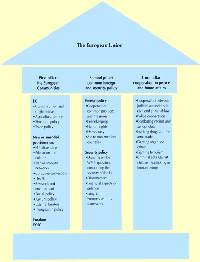Because the EU has supranational elements and intergovernmental elements, it cannot be designated as either a supranational or an intergovernmental organization. This is why we said at the beginning that it is not a country (or nation-state), nor is it a typical international organization.
It is a mixture of the two, and Europeans disagree about how much more integrated the EU members states should become. Some think it should move towards becoming a federation; others think that further integration should be viewed with caution. For example, the German position has generally favoured movement toward a federal EU, while the British are reluctant to cede more power to the EU and favour an intergovernmental EU.
A federation is “a system of government in which significant governmental powers are divided and shared between the central government and small subnational units,” based on a division of powers laid out in a constitution. Neither the central government nor the subnational governments control each other. In a federation, the central government usually controls foreign and security policy, currency and the army. Canada is a federation and its subnational governments are called provinces.
A confederation is “a system of government or administration in which two or more distinct political units keep their separate identity but transfer specified powers to a higher authority for reasons of convenience, mutual security, or efficiency.”[1] In this case the subnational units control the central government, which is given only specific powers. It is similar to an intergovernmental organization, in that the member states retain their autonomy and can control the central government. The United States began as a confederation.
As in the previous example, the European Union does not neatly fit either definition, but it could become either a federation or confederation in the future.
Now that you know the basics, you’re ready to start learning about more specific aspects of the EU! Start by navigating through the other units!
1. John McCormick. The European Union: Politics and Policies. Westview Press: Boulder Colorado, 1999. p.85.
